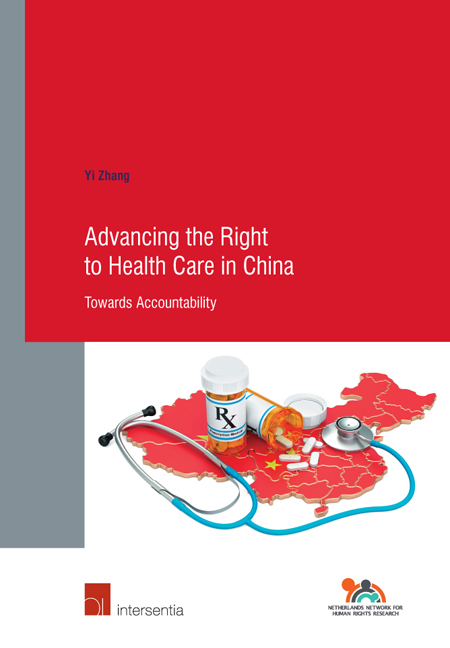Book contents
- Frontmatter
- Dedication
- Acknowledgements
- Contents
- List of Abbreviations
- Chapter 1 General Introduction
- Part 1 The Implementation of the Right to Health (Care) – An Analysis of China's Practice
- Part 2 An Analytical Framework for Right to Health-based Accountability
- Part 3 Advancing the Right to Health Care in China - Towards Accountability
- Annexes
- Annex 1 The Opera Framework
- Annex 2 The Evolving Conceptions of ‘Weisheng’, ‘Yiliao’ and ‘Jiankang’
- Annex 3 Comparison of Basic Medical Insurance Schemes
- List of Instruments
- United Nations Documents
- List of Tables and Figures
- Samenvatting
- Selected Bibliography
- Index by Paragraph
- Curriculum Vitae
- Human Rights Research Series
Annex 2 - The Evolving Conceptions of ‘Weisheng’, ‘Yiliao’ and ‘Jiankang’
from Annexes
- Frontmatter
- Dedication
- Acknowledgements
- Contents
- List of Abbreviations
- Chapter 1 General Introduction
- Part 1 The Implementation of the Right to Health (Care) – An Analysis of China's Practice
- Part 2 An Analytical Framework for Right to Health-based Accountability
- Part 3 Advancing the Right to Health Care in China - Towards Accountability
- Annexes
- Annex 1 The Opera Framework
- Annex 2 The Evolving Conceptions of ‘Weisheng’, ‘Yiliao’ and ‘Jiankang’
- Annex 3 Comparison of Basic Medical Insurance Schemes
- List of Instruments
- United Nations Documents
- List of Tables and Figures
- Samenvatting
- Selected Bibliography
- Index by Paragraph
- Curriculum Vitae
- Human Rights Research Series
Summary
As discussed in chapter 1, for a proper understanding of the implementation of the right to health care in China, it is necessary to distinguish the different concepts of weisheng, yiliao and jiankang, which will be explained in detail in the three sections.
Health and medical care, namely weisheng and yiliao in Chinese, often appear as a fixed phrase – ‘yiliao weisheng’ – in Chinese health laws and policies, but convey different meanings. Yiliao weisheng generally refers to a set of techniques to preserve ‘jiankang’, which means to avoid disease and prolong life.
WEISHENG
The word weisheng is currently used as the Chinese translation of various English words, such as hygiene, health or sanitation. Initially, however, it was applied in Chinese cosmology as an expression of ‘guarding life’ (literally translated from the two characters that comprise the term), referring to a set of techniques that individuals could employ to preserve health, avoid disease and prolong life. In many traditional Chinese medical texts, weisheng was more closely related to the so-called ‘yangsheng’ practices such as diet, meditation and movements. Yangsheng, often considered as macrobiotic hygiene, is a different practice from medicine in the Chinese context, but it still falls within the realm of personal health practices. For a long time, weisheng has been positioned as a subordinate subject in the research of Chinese medicine.
It was not until the late Qing in Guangxu's reign (1875-1908) that weisheng began its conceptual evolution. Ruth Rogaski, in her seminal scholarship on the meaning of health in treaty-port China, analysed the shifting conception of weisheng from Chinese cosmology to one encompassing ‘State power, scientific standards of progress, the cleanliness of bodies, and the fitness of races’, which she then termed ‘hygienic modernity’. According to Rogaski, the term weisheng was mainly used to convey an approach to health led by the State and the laboratory as well as other understandings related to health and disease in the early 20th century.
It was the Japanese physician Nagayo Sensai who, inspired by both the Western ideas of a State-centred public health system and the classical sinology, was the first to choose the word ‘eisei’– the Japanese transliteration of weisheng – as a translation of the term hygiene, in the 1875 Japanese National Medical Code.
- Type
- Chapter
- Information
- Advancing the Right to Health Care in ChinaTowards Accountability, pp. 323 - 334Publisher: IntersentiaPrint publication year: 2018

